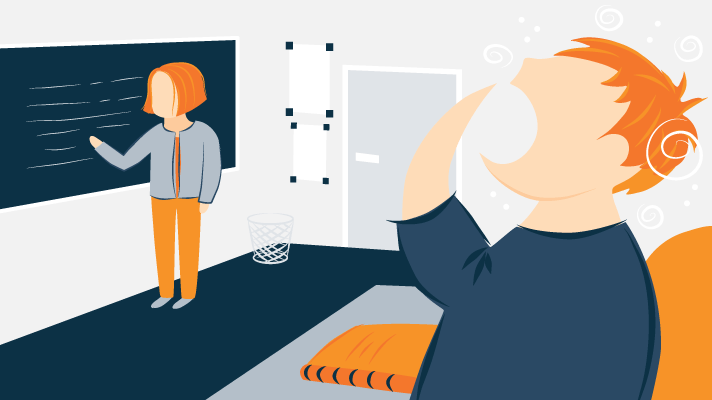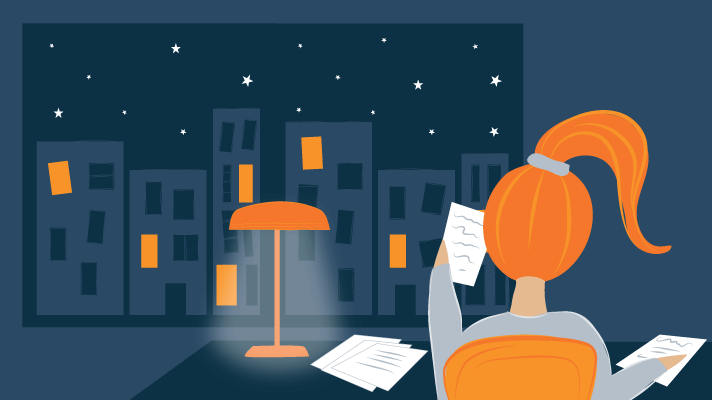Like anything, the answer varies, but there’s an ideal range that parents should make sure their teens get each night. When kids are sleep deprived, it can lead to a variety of problems, ranging from bad skin to behavioral outbursts.
In this article, we discuss the ideal amount of rest teenagers should get, and answer other burning questions, like why do they stay up so late?
Facts About Teens and Sleep
Sleep is a necessary process to refuel, recharge, and restore our bodies. As important as it is for adults, it’s even more critical for teens. Their bodies and brains are still developing, making shuteye crucial to ensure proper development.
As kids move from their childhood to their teenage years, they experience a shift in their biological clock. Once puberty hits, their clock moves back by about two hours. So, if you used to put your pre-teen to bed at nine o’clock with no challenges, you can expect your teen to resist going to be until about eleven.
This natural shift also means that they probably won’t feel rested unless they’re able to sleep until eight in the morning. Considering that this is the average school start time in the United States, it’s no wonder our teens are feeling chronically sleep-deprived.
How Much Sleep Do Teenagers Need?
Most studies report a range of eight to ten hours. The reality is that while eight hours may be the ideal for adults, this amount isn’t enough for adolescents. Instead, they should get 9 to 10 hours of rest each night. The sweet spot seems to be exactly 9 hours and 15 minutes.
Sadly, teens sleep an average of only seven to seven and a half hours per night. Perhaps this explains their moodiness and questionable behavior. On a serious note, it’s problematic when teenagers don’t get enough. It can result in poor academic performance, behavioral issues, and even fatal car accidents.
Importance of Sleep for Adolescents
Cognitive
Lack of proper bedtime has a negative effect on a teen’s cognitive abilities. This translates to poor memory, inability to make decisions and exercise good judgment, difficulty paying attention, and poor reaction time. Compromising cognitive function equates to poor performance in school and sports and can result in bodily harm as well.
A key sign of compromised cognitive function is a reduction in the ability to problem solve. If you have a teen that thinks the most minor of obstacles is a world crisis in the making, they may need to take a nap.
Behavioral and Social
Teens are known for being dramatic, but if they’re lashing out at you or their friends and teachers, this could be a sure sign of sleep deprivation. Not getting enough rest affects different parts of the brain, and one of the main portions of the brain that suffers most from deprivation is the amygdala, which controls fight-or-flight.
When we don’t get enough rest, the amygdala steals resources from the more logical and functional portions of our brain, making it difficult to distinguish between what’s a threat and what isn’t.
Emotional
We’re used to teens being emotional, but when they don’t get enough rest, their typical angst becomes more pronounced. Sleep-deprived teenagers are irritable, have a negative outlook on life, may become excessively emotional, and in extreme cases, they can become depressed or suicidal.
Academic and Performance
The inability to perform at peak cognitive function combined with emotional struggles is a recipe for disastrous academic performance.
Imagine trying to sit through a biology test when you can’t focus, remember facts, and can only think about how your life is over because there’s a spot of ketchup on your white blouse that everyone in the school is noticing and whispering about behind your back.
It sounds extreme, but this is the reality that’s happening every day in the mind of a sleep-deprived teen.
Effects of Sleep Deprivation on Teens
Mood
When adults get grumpy, we tend to blame it on being hangry or having PMS. Gender stereotypes aside, with teens, we’ve got to look a bit deeper. Often mood swings, irritable behavior, and a cranky attitude are the result of getting too little shuteye the night before.
If your teen is getting frustrated more easily or seems upset about trivial matters, check to make sure their bedtime schedule is adequate.
Behavior
Sleep deprivation rewires the brain to limit reason and judgment in favor of impulsiveness and irrational behavior. Teens who don’t get enough rest are more likely to take unnecessary and even “stupid” risks like unsafe sex, drunk driving or breaking laws.
Cognitive Ability
The inability to think clearly is a classic symptom of sleep deprivation. If you notice that your teen is not focused, paying attention, or remembering something you just told them, you may need to help them allocate more time in their sleeping schedule. Cognitive ability is crucial for academic performance.
Academic Performance
When teens don’t get enough rest, test scores and grades drop, attendance suffers, and the student may even fall asleep in class.
Find Out More: Importance of Sleep for Students Success
Drowsy Driving
If your teen is of driving age and has a car, it’s imperative that you monitor their sleeping schedule. Teenagers who don’t get enough rest are more likely to doze off at the wheel. It doesn’t help that one of the peak times for this to happen is between three and four o’clock in the afternoon, a time when they’re most likely to be on the road on the way home from school.
The other likely time for falling asleep at the wheel to occur is between two and four o’clock in the morning. If your teen has been out with friends and is driving home, this is also a peak time for drunk drivers to be on the road. A tired teenager combined with a drunk on the road makes the highway an even more dangerous place for your child.
Frequently Asked Questions
Should adolescents sleep more if they are involved in athletics?
Yes, teens who play sports need to rest more than their less active peers. Not only will it help enhance mood and alertness, but it can also increase performance and reaction times. It’s also necessary for tissue repair and restoration. By contrast, being in a deficit harms all of these measures.
In one study conducted at Stanford University, athletes who added an extra hour of sleep to their schedule were more likely to break their personal records and perform at their peak.
Why does my teenager like to sleep in on the weekends?
If your teen rolls out of bed at noon on a Saturday and asks for some pancakes, this is a sure sign that their body is trying to make up for sleep debt.
As an adult, most of us are guilty of the same thing. We burn the candle at both ends during the week and get an hour or so less time in bed each night than we should. Then, when the weekend comes, we’re so exhausted that we collapse into bed and stay there well past daybreak.
The problem with this behavior is that it throws off your teenager’s internal clock. By staying up late on the weekends, it’s harder for them to fall asleep at a reasonable hour on Sunday night. They’ll stay up beyond bedtime and then struggle to wake up on Monday morning. The whole cycle repeats itself.
Is it normal for them to stay up so late?
Sadly, yes. When your child moves into puberty, their internal clock shifts by about two hours. This means that they won’t be sleepy until about two hours later. If they used to go to bed easily at eight o’clock in the evening, now they won’t feel ready for bed until ten or later.
This shift is why doctors and legislators are discussing measures to change the average start time of schools to accommodate teens’ nocturnal schedules.
Getting your teenager on a regular schedule is the most effective way to help them fall asleep at a reasonable hour. It’ll be a challenge, and they’ll have to be willing to cooperate for this to work.
If they’re physically struggling and not just being argumentative, you may need to help them relax before bed to induce drowsiness. For example, you could encourage them to snuggle up with a book before bed if they need some quiet relaxation time.
Setting up your teen’s room for relaxation is also important. Make sure that there are no bright lights filtering in from outside, ban smartphones before bed, and consider a white noise machine to help lull them to sleep.
The use of electronic devices is probably the number one culprit, so limit your teen’s time on social media, YouTube, etc. in the hours leading up to bed.
What can they do if they struggle to fall asleep?
Getting your teenager on a regular schedule is the most effective way to help them fall asleep at a reasonable hour. It’ll be a challenge, and they’ll have to be willing to cooperate for this to work.
If they’re physically struggling and not just being argumentative, you may need to help them relax before bed to induce drowsiness. For example, you could encourage them to snuggle up with a book before bed if they need some quiet relaxation time.
Setting up your teen’s room for relaxation is also important. Make sure that there are no bright lights filtering in from outside, ban smartphones before bed, and consider a white noise machine to help lull them to sleep.
The use of electronic devices is probably the number one culprit, so limit your teen’s time on social media, YouTube, etc. in the hours leading up to bed.
Is it normal for an adolescent to sleep walk?
While sleepwalking is fairly common in children, most outgrow it by the time they reach adolescence. However, sleepwalking in an adolescent is a sign of sleep deprivation, so check your teen’s schedule to see if lack of shuteye could be causing these nocturnal walks.
Some medications also cause sleepwalking. If your teen is on any prescriptions, check the package insert for side effects, and ask your doctor if the prescription could be responsible for the behavior.
Get More Info: FAQs about Sleepwalking
Conclusion
Most teens don’t realize how important their bedtime is to their health and their future. Talk with your child and let them know why it’s necessary for them to get adequate rest each night. Be supportive and make sure they know that they don’t have to pull an all-nighter studying for a test or doing homework.
If your child’s school hasn’t adopted a later start time, check with the administrators and find out how you can get involved to make that legislative change.
You’ve got only a few short years left with your teen before they head off to college or fly the nest to start a career. By helping them establish healthy habits now, they’ll be better equipped for success in the future.
Sources and References:
- Teens and sleep: Why you need it and how to get enough – ncbi.nlm.nih.gov
- Teenagers and sleep – medlineplus.gov
More Reading:
- Delayed Sleep Phase Syndrome (DSPS) Explained
- What Are The Best Teas To Help You Beat Insomnia?
- Is It Really Better To Sleep in a Cold Room?
- Why Does Warm Milk Make You Sleepy?
Jill Zwarensteyn
Editor
About Author
Jill Zwarensteyn is the Editor for Sleep Advisor and a Certified Sleep Science Coach. She is enthusiastic about providing helpful and engaging information on all things sleep and wellness.
Combination Sleeper





